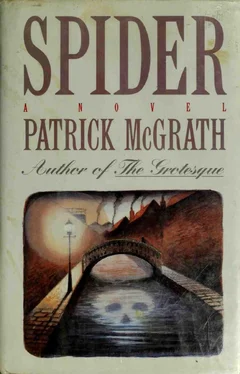What a Spider was seen in the first pale light of dawn! What a broken haggard shadow of an echo of a joke of a man! What a husk, what a wreck, what a wretch! But he lived, he lived. I stood at my table leaning on my hands and gazing at the sky: the night was over, I had come through. There was silence; the shrieking had ceased, the furor was ended, I was the fragile vessel caught on the open sea in a storm by night that limps at dawn into some small cove or harbor with his mainmast splintered and his helmsman roped to the wheel, bleary with fatigue and spent terror. Small comfort, the haven of daylight, but comfort nonetheless. Cardboard crackled as I shifted my limbs, moved to the bed, lay on my back and gazed at a damp-stained ceiling that an hour before had been a demon’s dark canvas of hellish forms in coils and knots that squirmed, spat, oozed with filth and violence. But for now the ebb of night, the heave and swell of silent dawn: my Pacific.
The beached Spider lay on his bed with his legs crossed at the ankles and watched the smoke of a thin one rise in a slender column that broke into whorls and faded away. He thought of his rope in the fireplace, and he knew it was almost finished, this sorry jig of his, this jig in hell; enough, he murmured to the silence, enough enough enough.
Dr. McNaughten was in Mrs. Wilkinson’s office when I left the kitchen after breakfast. “Good God, man, what’s happened to you!” he cried as I shuffled in. “Sit down!” I sat. He peered at me, frowning, then went to the door and shouted for Mrs. Wilkinson. “Has this man been taken off his medication?” he said, not troubling to lower his voice.
“Of course not, doctor,” said Mrs. Wilkinson in hushed tones, drawing him away from the door so that I could hear no more of their conversation. A few minutes later he was back with me. “Dennis,” he said, “I believe you’ve been hoarding your medication. Tell me frankly: have you?”
What did it matter now? A shrug, a sigh from the weary Spider. The doctor frowned at me, then went to the window, where he stood with his back to me; one hand was in his trouser pocket, the other was drumming on the sill. Silence; after some minutes the door opens. It is Mrs. Wilkinson. She goes to the desk and spills onto it a dozen or so soot-stained tablets; she is also carrying my rope, and this too she puts on the desk. I sit up with an involuntary start of alarm: where is my book? Dr. McNaughten looks at me, shaking his head. “Thank you Mrs. Wilkinson,” he says. He returns to the window, and again stands with his back to me, gazing out. Eventually, and without turning, he speaks. “I’m almost convinced that I should commit you,” he says, “but I want to give you one last chance.”
♦
When I got back up to my room I found to my great relief that the book was safe. I was not to be sent back to Ganderhill; Dr. McNaughten had a number of reasons for this decision, one of which was that before I stopped taking my medicine I was apparently making “progress.” Toward what, he didn’t say.
Even when a man has nothing to call his own he finds ways of acquiring possessions; he then finds ways of concealing his possessions from the attendants. What you did on a hard-bench ward was tie one end of a piece of string to a belt loop, and the other end to the top of a sock, then have the sock dangle down the inside of your trousers. In it you kept tobacco, sewing materials, pencil and paper, other bits of string—whatever you had that was of use or value. Men grew attached to their socks: life was cut to the bone on a hard-bench ward, and this was a way to flesh it, make you feel more than a mere creature of the institution. Men fought bitterly to retain their socks, when the attendants decided to confiscate them. When that happened you’d lose your clothes as well as your sock and be thrown into a safe room in an untearable canvas gown, or you’d be straitjacketed, buckled and trussed like a game bird lest you break your knuckles hammering on the wall.
During the later years in Ganderhill I had a room on a good downstairs ward in Block F and enjoyed all the privileges the institution could give me. But in the early years I was usually up among the sad men, and often in a safe room in a strait-jacket. I remember the first time it happened, how a couple of attendants had begun talking about me while I sat smoking on the other side of the dayroom. Glancing over at me, the one attendant then told the other that I was here because I’d murdered my mother. Naturally I disputed this; I told them it was not me but my father who had killed her. They laughed and then for a while they talked of other things. But after a few minutes they were again discussing me, and again it was said that I’d killed my mother. Again I contradicted them; they told me not to get upset, not to get myself into a “state.”
This was rich. I remember that I began to rock backwards and forwards on the bench (a thing I couldn’t control) and my fingers were trembling violently. The Spider was making desperate scurrying movements, back and forth, backwards and forwards, so it felt, seeking with growing desperation some niche or cranny to crawl into. Rapidly the dayroom grew dark, and the two attendants sat watching me with animal intensity as my rocking grew violent. There was noise, screaming, then they had me pinned to the floor as the light ebbed and swelled. Then came the weirdly familiar clank of buckles, and the frenzied Spider, with the sensation of sudden constriction as they tightened the straps, at last saw his hole and slipped into it, and nothing more until he found himself in a safe room, trussed like a Christmas chicken and the single thought going round and round and round in his head that it was his father, his father, his father his father his father...
Not easy to think of those times now (perhaps it’s a mark of my so-called progress that I can dwell upon them at all) but it was to a great extent the work of those first years in Ganderhill to learn to endure such goading—which eventually I did: there came a time when I could hear them attempting to awaken the violence in me, when they’d murmur, one to another, about my mother, and instead of growing agitated—starting to rock and tremble, to scuttle about like a crab in search of a stone—instead of all that the Spider developed structures that could withstand provocation, he tirelessly rebuilt, he rehearsed with constant industry, and so became able to withstand the goads, and as this began to happen then so did the goading subside, and he was left alone. Life in Ganderhill began at that moment to improve.
I am sitting by the river, my furled umbrella leaning against the bench beside me. An overcast day, and very windy. I am drowsy from my medicine, perhaps this too helps me think of the early Ganderhill years without agitation. Other patients—John Giles, Derek Shadwell—would never do to me what the attendants did: with each other we had no reason to doubt, or lie. It occurs to me though that a function of the goading, deliberate or otherwise, was to force me to face and understand what had happened in Kitchener Street: this was why, you see, when I did, it eventually stopped, though this was not effected speedily, no, it took years, there were frequent collapses that would see the Spider once more curled like an infant under a blanket, or asleep on a bench with his head on a shoe. But what was happening during this period was the further development of the two-head system: back there where the Spider lived, that’s where we find the sad, true tale of Kitchener Street (the one I’m telling you now). And on the ward, in the dayroom, Ganderhill inmate Dennis Cleg moved unperturbed, a mask, a ghost, a puppet, among false rumors, scandalous imputations and provocative goads—for the Spider was elsewhere! (Until, that is, Dr. Austin Marshall retired and a new medical superintendent took over, and this man managed, in the space of two afternoons, to undermine all my work; but of him more in due course.)
Читать дальше












